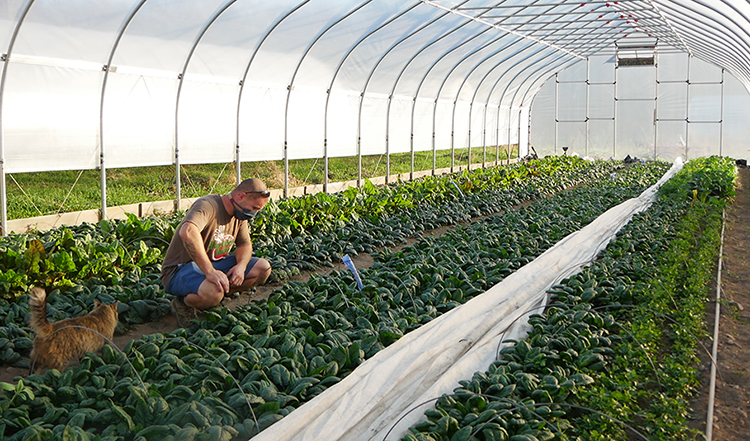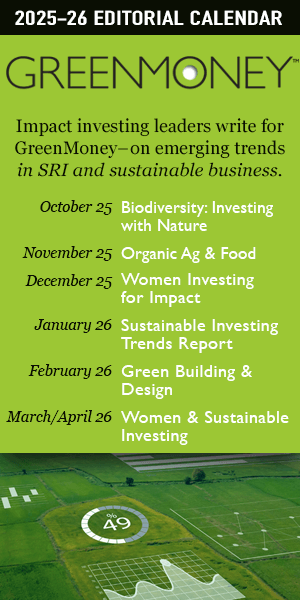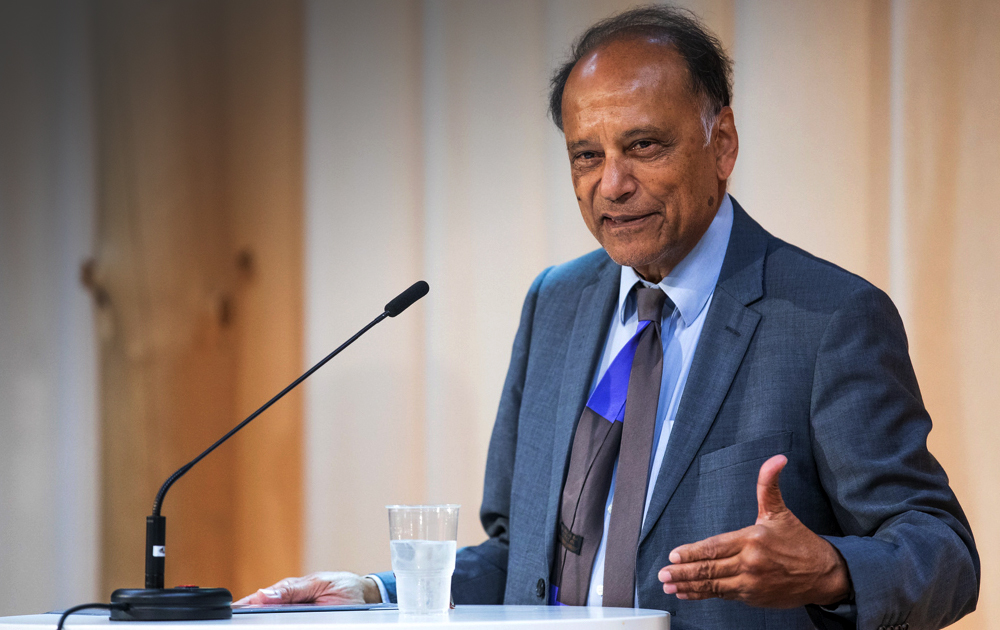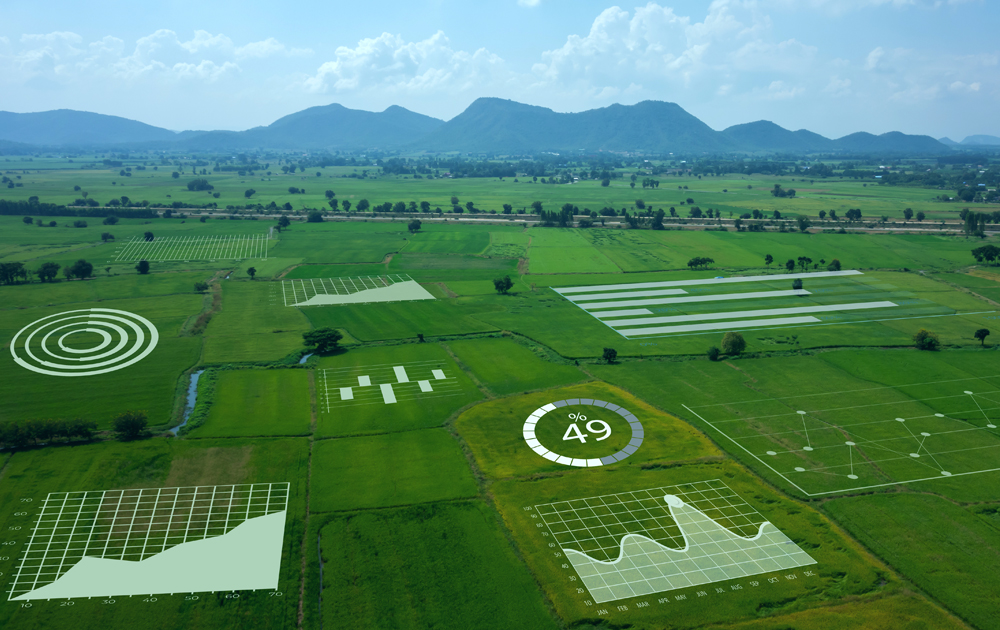(Originally published June 2021)

(above) Dorothy Suput, The Carrot Project’s Executive Director (left), with farmer Tyler Sage of Sage Farm (Bernardston, MA) and his pasture-raised heritage pigs. Photo by Genevieve Goldleaf.
During the pandemic, farmers and food producers selling locally showed their strength, as the weaknesses of our global food supply chain were exposed. Farmers relying on wholesale distribution systems, such as dairies, were dumping product because of a breakdown in supply chains. Meat processing plants slowed operations, negatively impacting supply. Meanwhile, local producers ramped up production, updated their online systems, or pivoted from institutional buyers to grocery stores and direct-to-consumer sales. Thriving local farms not only came through with good food, but continued to steward the land and give back to their communities. Our local food ecosystem’s resilience results from the incredible work ethic of farmers, buoyed by collaboration with business development programs and the help of state and federal governments, philanthropy and the growing role of private investors.
Heart Beets Farm, Steve Murray’s diversified vegetable farm in southeastern Massachusetts, shows how farmers serving local markets reacted to the pandemic. When demand for safe and local food exploded in spring 2020, Steve was able to make a rapid, confident pivot. To protect themselves and their customers, he made the risky decision to drop their farmers’ market, and close their farm stand. Instead, Heart Beets almost doubled the number of farm shares offered from 120 to 210 — and sold out.

This huge decision was possible because Steve tracks his numbers carefully; thanks to business support from The Carrot Project, he knew exactly which parts of his farm were most profitable. He was able to analyze his enterprises and assess a path toward profitability and stability in this tumultuous year. Shifting to online-only CSA sales worked so well he plans to retain it for the foreseeable future. Steve’s farm grew to its current state with the help of a Carrot loan to invest in equipment, backed by social impact investors and matched by a state program for beginning farms.
Investing in local and sustainable farms and food businesses strengthens communities, especially in the wake of this pandemic. “We\’re all going to have some collective trauma to work through,” said Janet Steward, co-owner of Greenfield Highland Beef in Greensboro Bend, VT, and an early Carrot loan recipient. “As farmers, we have a special role in healing and care. Farmers have the gift of being able to care for their communities with food.”

Opportunities to invest in local food are expanding. For example, after developing their business skills with The Carrot Project, farmers can now move on and seek other types of investments from capital providers that work with private investors, such as the PVGrows Investment Fund and Dirt Capital Partners. Three former Carrot clients have secured farmland with Dirt Capital Partners.
How did we arrive at this growing ecosystem of capital providers for local, sustainable agriculture? It didn’t happen overnight. Before banks consolidated, a trend that escalated in the 1990s, small farms could usually access capital easily. When The Carrot Project started in 2006, there was little recognition that the banking sector no longer met the needs of the small, but growing, local agricultural movement. Capital providers tended to assume that when a farmer was unable to secure capital, it was the farmer’s fault, thinking the farmer had a poor business or wouldn’t do the work to meet the needs of the lender.
This vacuum of capital for farmers led to funds working with private investors. Over the last fifteen years, the availability of capital has transformed. In addition to the funds mentioned above, private investors started Slow Money and investments took off through state, regional, and local chapters. Most New England states’ community loan funds or CDFIs, who already work with private investors, added programs to support local sustainable food and agriculture. New too are social impact funds that include food and agriculture among a broader array of opportunities, such as Vermont’s Flexible Capital Fund. In the Northeast, the newest entries include The Maine Harvest Federal Credit Union, launched in 2020, and the Hudson Valley Agribusiness Development Center, which recently became a CDFI and anticipates working with private investors.

Another major shift is an increasing awareness of the critical role of business development services, which mitigate risk and support long-term viability. After The Vermont Farm and Forest Viability Program and The Carrot Project documented the critical impact of business technical assistance, and capital became more widely available than when we started, The Carrot Project’s focus shifted from providing loans to offering business technical assistance, particularly helping farmers manage their finances. Recognizing the importance of business development services also led to starting the Agricultural Viability Alliance. The Alliance’s goal is to increase the number and economic viability of farm and food businesses, by bringing together business assistant providers and organizations from across New England and New York’s Hudson Valley to address shared challenges, facilitate more uniform high-quality coverage, and share and expand limited resources.
As the landscape changes, so do the opportunities for social impact investors. Some local farm and food businesses are looking for ways to grow or scale; others are looking to build stronger community connections; and still others want to keep their businesses small and financially sustainable. The average farmers’ age in the US is 57; opportunities to invest in farmland succession, transfer, and access will continue to be important to support the massive transition of land anticipated by 2040. New funds, such as the Black Farmers Fund, and new investment opportunities to help with mitigation and adaptation to climate change are on the horizon. Others are starting to research and organize asset classes and figure out what it will take to make investing in local sustainable agriculture and food systems more readily available. These developing opportunities, combined with those that have emerged over the last 15 years, provide investors with options to join this crucial and hopeful sector that is growing good food, stewarding the land, and giving back to communities.
Article by Dorothy Suput, founder and executive director of The Carrot Project. Dorothy’s commitment to a sustainable food system grew out of the incredible contrasts between Midwestern agriculture, with which she grew up, and the locally focused food and farming system in Switzerland, where she lived after graduating with a BS from Purdue University. Dorothy formalized her commitment when she returned to the U.S. to complete her Masters degree, from Tufts University’s Urban and Environmental Policy and Planning program, by focusing on sustainable agriculture and non-profit management. Following graduate school, she worked as the first regional organizer on the 1995 Farm Bill for the Northeast Sustainable Agriculture Working Group under the auspices of the Campaign for Sustainable Agriculture, and subsequently, as a consultant for the Hartford Food System, Red Tomato, and The Food Project. Dorothy serves on the Board of Managers for the Vermont Sustainable Jobs Fund Flexible Capital Fund and the Advisory Committee for the PVGrows Investment Fund.

















